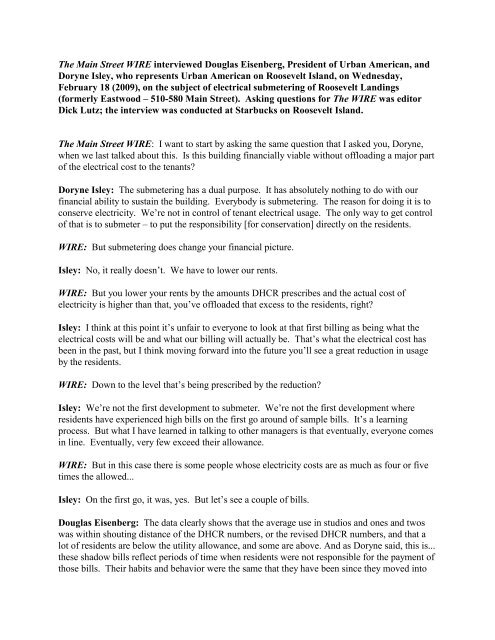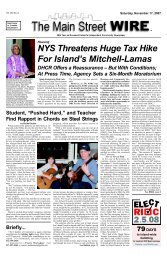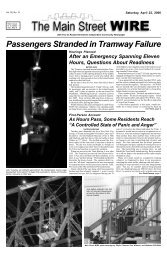Transcript: Isley & Eisenberg - Main Street WIRE
Transcript: Isley & Eisenberg - Main Street WIRE
Transcript: Isley & Eisenberg - Main Street WIRE
You also want an ePaper? Increase the reach of your titles
YUMPU automatically turns print PDFs into web optimized ePapers that Google loves.
The <strong>Main</strong> <strong>Street</strong> <strong>WIRE</strong> interviewed Douglas <strong>Eisenberg</strong>, President of Urban American, and<br />
Doryne <strong>Isley</strong>, who represents Urban American on Roosevelt Island, on Wednesday,<br />
February 18 (2009), on the subject of electrical submetering of Roosevelt Landings<br />
(formerly Eastwood – 510-580 <strong>Main</strong> <strong>Street</strong>). Asking questions for The <strong>WIRE</strong> was editor<br />
Dick Lutz; the interview was conducted at Starbucks on Roosevelt Island.<br />
The <strong>Main</strong> <strong>Street</strong> <strong>WIRE</strong>: I want to start by asking the same question that I asked you, Doryne,<br />
when we last talked about this. Is this building financially viable without offloading a major part<br />
of the electrical cost to the tenants?<br />
Doryne <strong>Isley</strong>: The submetering has a dual purpose. It has absolutely nothing to do with our<br />
financial ability to sustain the building. Everybody is submetering. The reason for doing it is to<br />
conserve electricity. We’re not in control of tenant electrical usage. The only way to get control<br />
of that is to submeter – to put the responsibility [for conservation] directly on the residents.<br />
<strong>WIRE</strong>: But submetering does change your financial picture.<br />
<strong>Isley</strong>: No, it really doesn’t. We have to lower our rents.<br />
<strong>WIRE</strong>: But you lower your rents by the amounts DHCR prescribes and the actual cost of<br />
electricity is higher than that, you’ve offloaded that excess to the residents, right?<br />
<strong>Isley</strong>: I think at this point it’s unfair to everyone to look at that first billing as being what the<br />
electrical costs will be and what our billing will actually be. That’s what the electrical cost has<br />
been in the past, but I think moving forward into the future you’ll see a great reduction in usage<br />
by the residents.<br />
<strong>WIRE</strong>: Down to the level that’s being prescribed by the reduction?<br />
<strong>Isley</strong>: We’re not the first development to submeter. We’re not the first development where<br />
residents have experienced high bills on the first go around of sample bills. It’s a learning<br />
process. But what I have learned in talking to other managers is that eventually, everyone comes<br />
in line. Eventually, very few exceed their allowance.<br />
<strong>WIRE</strong>: But in this case there is some people whose electricity costs are as much as four or five<br />
times the allowed...<br />
<strong>Isley</strong>: On the first go, it was, yes. But let’s see a couple of bills.<br />
Douglas <strong>Eisenberg</strong>: The data clearly shows that the average use in studios and ones and twos<br />
was within shouting distance of the DHCR numbers, or the revised DHCR numbers, and that a<br />
lot of residents are below the utility allowance, and some are above. And as Doryne said, this is...<br />
these shadow bills reflect periods of time when residents were not responsible for the payment of<br />
those bills. Their habits and behavior were the same that they have been since they moved into
the property when the owner was paying the bills. I think we can all agree that this is not about<br />
creating a profit center for us. This is for conserving energy. We think that if everyone does<br />
their part this is a good thing for everyone.<br />
<strong>WIRE</strong>: I have to say, because you put such an emphasis on conservation as the purpose, that<br />
what I’m hearing from residents is that they see this as a way of making the building financially<br />
viable, and they see it as a major way of offloading a major expense of the building’s expense<br />
onto residents. They fear the building is untenable, financially. I think you have to predicate the<br />
possibility that the DHCR allowance is not big enough if a person receives a sample bill that is<br />
five times what the DHCR numbers mandate.<br />
<strong>Eisenberg</strong>: I understand.<br />
<strong>WIRE</strong>: You still have a major discrepancy there in the amount of electricity charge an individual<br />
tenant is going to face.<br />
<strong>Eisenberg</strong>: Look, I pay my electric bill every month, Doreen pays her electric bill every month.<br />
When I leave a room, I shut the lights off. I make sure windows are closed. I’m careful about<br />
my use of electricity.<br />
<strong>WIRE</strong>: You think that’s going to do it in this building?<br />
<strong>Eisenberg</strong>: What I’m saying is that if people are careful and are mindful of how they use<br />
electricity, I’m confident that the bills will come down. I’m also confident that we’re going to<br />
make every effort to help residents winterize their apartments do everything we can to help them.<br />
If a resident decides to leave a TV on all day, their lights on all day, and have three computers on,<br />
or who knows what...<br />
<strong>WIRE</strong>: You’re talking about me...<br />
<strong>Eisenberg</strong>: Look, that’s a choice that a resident makes, and they’re going to have higher<br />
electricity bills as a result of the choices they’re making. To the question of whether or not the<br />
building is financially viable? It’s financially viable now, and it’s financially viable if we<br />
submeter. We’ve done nothing since we bought this property but invest in it.<br />
<strong>WIRE</strong>: But tenants are fearful that the shadow bills will go up to a fairly large real number in the<br />
very cold months. The DHCR allowances are area-wide, apparently not intended for electric heat<br />
situations. This building has electric heat and we know that’s an expensive way to heat a place.<br />
It still strikes me that it’s really difficult to imagine that these bills, even after turning off the<br />
lights, leaving the TV set off, and turning off the three computers, it’s hard to imagine that<br />
they’re going to be able to get their bills down to the DHCR allowance, which seems not to be<br />
predicated, as best I can tell, on electric heat. Is there a way compensate for that?<br />
<strong>Isley</strong>: There are other buildings that are similar to ours that have the same similar heating<br />
elements that also receive subsidy allowances. They have no problem. I see no reason why our
uilding cannot reach the same stage.<br />
<strong>WIRE</strong>: You’re talking about 2 and 4 River Road.<br />
<strong>Isley</strong>: Correct.<br />
<strong>WIRE</strong>: You see those two situations as being parallel?<br />
<strong>Isley</strong>: Yes.<br />
<strong>WIRE</strong>: In order to be parallel wouldn’t you have to do in an engineering study, do all the<br />
insulation and weather stripping and the rest before going into the shadow bills phase?<br />
<strong>Eisenberg</strong>: Can I ask you a question?<br />
<strong>WIRE</strong>: Yes.<br />
<strong>Eisenberg</strong>: We live in a time that our government is asking us to do everything we can to<br />
conserve energy and be efficient, and this is a way to do that, unequivocally.<br />
<strong>WIRE</strong>: I don’t think anybody’s against conservation.<br />
<strong>Eisenberg</strong>: This is a way to achieve that goal.<br />
<strong>WIRE</strong>: Right. But in terms of a parallel between 2 and 4 River Road and Easgtwood, the<br />
buildings are of a severely different age.<br />
<strong>Isley</strong>: Not severely. Ten years maybe. Ten years difference. And we have new windows. They<br />
don’t. When you start measuring apples to apples and oranges to oranges...<br />
<strong>WIRE</strong>: But the normal way – didn’t they carry out an engineering study in advance of going into<br />
the submetering mode?<br />
<strong>Isley</strong>: We are all required to do that.<br />
<strong>WIRE</strong>: You’ve done that?<br />
<strong>Isley</strong>: Yes.<br />
<strong>WIRE</strong>: And what about the other conservation measures that would reduce electricity use? I<br />
know you have done a lot, but there’s probably significantly more that could be done.<br />
<strong>Isley</strong>: In all fairness to us, we bought the building. You buy the building “as is.” We have this<br />
world-wide mandate that’s coming down to conserve energy and everybody’s moving in that<br />
direction. All of the buildings that have been master-metered are under this mandate to do
something to conserve energy. We attempt to do it the best way we can, given the building that<br />
we inherited. But no one gives us credit for spending $5 million on windows. No one gives us<br />
credit for the fact that, annually before now, we have done winterization for our residents.<br />
There’s a lot of credit that we’re not given and there is a lot of fine tuning and nitpicking – you<br />
know, “Let’s look and see what they didn’t do.” But no one at all is saying, “You know what?<br />
They went in there and put in new windows for $5 million.”<br />
<strong>WIRE</strong>: In the article, I’ll make a definite note of that.<br />
<strong>Isley</strong>: Please do.<br />
<strong>WIRE</strong>: But then you’ve still got the situation where a tenant getting $1200 in Social Security,<br />
paying 30% of that for housing, getting a bill that’s five times what the reduction is. His out-ofpocket<br />
housing cost may triple.<br />
<strong>Eisenberg</strong>: I think you make a great point. But we’re not in the business of creating vacancies<br />
or raising rents as fast as we can. We’re in the business of making sure those people have a<br />
decent place to call home, that they have a building which has an infrastructure that is good and<br />
is working, that the elevators are working, and that things get taken care of. Whether they’re<br />
paying $300 or $3,000, they’re all treated the same, with absolute dignity. That’s what we’re all<br />
about. And we think that one of things we can do here is that this building can be run more<br />
efficiently, that we can conserve energy, and that’s why we went down this path. We spent a lot<br />
of capital to do this. It’s not instant payback by any stretch of the imagination. The goal here is<br />
to work with the residents, because I think that a lot of the residents believe in conserving energy.<br />
They believe the same things we do. Everybody wants the same result. The nitpicking is<br />
counterproductive. Comments fly back and forth and you’re the big bad landlord and you’re out<br />
to get us. It couldn’t be farther from the truth. The people know Doryne at this property, and<br />
people who know me, they know that’s not the case. But instead of sitting down at the table and<br />
figuring out a solution, it’s “Hey, let’s have a press conference and ruffle some feathers and see<br />
we can stir up.”<br />
<strong>Isley</strong>: In all fairness to us, we’ve been talking about submetering for a long time, and we’ve<br />
been talking about the submetering with the local politicians and their representatives. This is<br />
not something we all of a sudden decided we were going to do. We were talking about this<br />
minimally for six to nine months in advance. Where were all of their comments then? Where<br />
were all of their concerns then? I met with them monthly.<br />
<strong>WIRE</strong>: You feel betrayed?<br />
<strong>Eisenberg</strong>: No, Listen, government officials are there to protect the people that live in their<br />
districts and they do a very good job, and I think it’s their job to make sure that every stone is<br />
turned over and every issue is resolved, and maybe some of these issues should have been<br />
resolved earlier, and maybe that would’ve made this an easier process. But it is what it is, and<br />
we are who we are, and all we’re saying now is that we want to work with the residents and<br />
elected officials to figure out the best solution so that, at the end of the day, we have a building
that’s conserving energy and we have residents who are happy to live there and have a decent<br />
place for them to call home. It’s really simple and to make more of that is not necessary.<br />
<strong>WIRE</strong>: Let’s look at the worst-case scenario for a minute...<br />
<strong>Eisenberg</strong>: The worst-case scenario is the building doesn’t end up being submetered and we<br />
invested money in submetering it and we never get that money back. That’s the worst-case<br />
scenario. But the silver lining, hopefully, would be that all 1003 residents signed up to get their<br />
apartments winterized and we’re able to conserve energy that way.<br />
<strong>WIRE</strong>: The worst-case I was actually thinking of when I started asking the question was this:<br />
Let’s say you go through this, submetering starts, and someone comes in and says, “Look, I was<br />
paying $300 a month. I do everything I can to conserve electricity. I turned everything off, and I<br />
let my apartment get cold. But my electric bill has tripled my cost of housing.” What do you do<br />
then?<br />
<strong>Isley</strong>: I think we need to get to that point before we can speculate. We need to get to that point<br />
and see whether or not we actually do have people in that category, and how many people they<br />
are, and who they are.<br />
<strong>WIRE</strong>: Some fear they’re going to end up there, so rather than wait, wouldn’t it be better to say,<br />
“We have a plan...”<br />
<strong>Eisenberg</strong>: I’m sure that you know better than I that, when it comes to residents, Doryne will –<br />
as long as people are being straightforward – Doryne will go to bat for them. She has done it<br />
time and time again when it comes to reinstatement of Section 8 vouchers, and time and again<br />
with regard to what size unit people should be in. That’s something that I don’t think we should<br />
lose sight of because if, indeed, you fast-forward and submetering produces a problem like that,<br />
all they have to do is say, “Hey, I’ve got an issue,” and we’ll deal with it. I think we’re the first<br />
ones who are going to say, “Yeah, sure, let’s figure this out together. Let’s look at your energy<br />
uses, Let’s make sure your apartment is weatherized, and if we’ve got a situation here, let’s deal<br />
with it.”<br />
<strong>WIRE</strong>: I sense from what you’re saying that your intention is that nobody will have to leave the<br />
building because their electricity costs are higher than they can afford.<br />
<strong>Eisenberg</strong>: That is not the intention here at all.<br />
<strong>Isley</strong>: That would be disastrous.<br />
<strong>Eisenberg</strong>: I understand that that probably makes for distress when an advocate makes a<br />
statement like that or an elected official makes a statement like that.<br />
<strong>WIRE</strong>: You’re saying that it’s not going to happen.
<strong>Eisenberg</strong>: I’m saying that if we have anything to do with it, it won’t happen. Now, the other<br />
thing you should keep in mind is that the people who work at DHCR are incredibly mindful of<br />
the residents and they are there to make sure that the residents are taken care of. They’re<br />
watching over them, to a certain extent. They will make sure that people with disabilities have<br />
the right allowance and the senior citizens who are on fixed incomes will be okay.<br />
<strong>Isley</strong>: We were the ones that brought that to the table when we were sitting down with DHCR –<br />
to take into account the residents who have equipment that needs to be on at all times.<br />
<strong>WIRE</strong>: I understand that you can’t make a blanket guarantee that, no matter what somebody<br />
does with her or his energy, they’re not going to be evicted, or that they won’t have to move if<br />
they can’t bring their electricity costs down. One of the things that [Assemblymember] Micah<br />
Kllner is talking about in this context is that he thinks that there is a contradiction in the lease –<br />
that the landlord must provide heat but submetering includes heat when the tenant has to pay for<br />
the submetered electricity. He sees a conflict in that. Do you see a problem there?<br />
<strong>Isley</strong>: I’m not an attorney, but I don’t see a problem there. This matter couldn’t have gotten<br />
through the initial acceptances if there was a problem with the language in our lease. We’re very<br />
confident in our application is valid and complete.<br />
<strong>WIRE</strong>: So, I gather your message, overall, is, “Just don’t worry.”<br />
<strong>Isley</strong>: I think that between us, the agencies, the politicians, the residents, I think we’re all<br />
reasonable people and I believe that reasonable people can come to the table and come up with<br />
reasonable solutions to problems – and I believe we can do it in this case.








